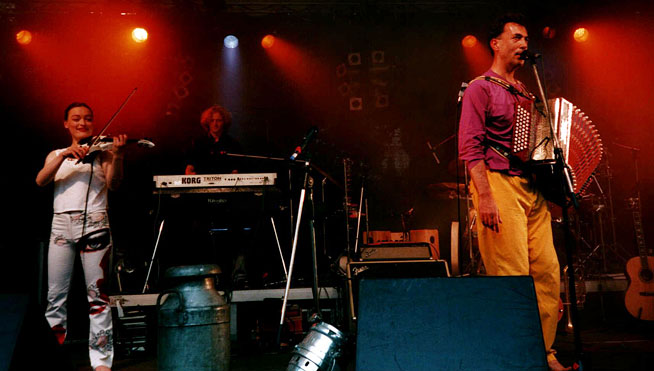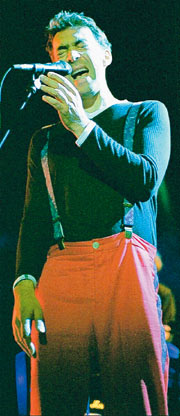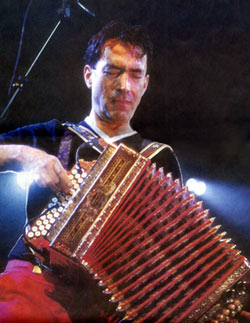FÖN
Hubert von Goisern: Live in Bad Ischl - 22nd June 2001
Inspiring primal screams from Hubert
Finkenstein - The yodel, a form of primal scream, is the source of his success and is the central element in many songs. After a six year break, Hubert von Goisern is making live music again and made his fans in Finkenstein happy. The artist used the many years of break for worldwide musical travels and let the experiences won leave their mark on his new album Fön, for many his best until now. He has kept his charisma, not forfeiting his musicality. Hubert Achleitner from Bad Goisern with his hot band aroused a true "Fön storm" around the Burgarena. Elements of reggae, rock, jazz and blues were mixed with African, Caribbean and Alpine sounds and formulated a successful mixture of sound. In this world music conglomeration, the versatile artist played the guitar, accordion, harmonica, flute, trumpet, horn and drum and used his voice flexibly. His lyrics have become still subtler, describing love and loss, pleasure and sorrow. In the well attended music tent, the audience were enthused without Hiatamadl, pushing towards the stage towards the end, rocking in time and only moving away after a few encores.
Hubert von Goisern: Live in Eschwege - 26th May 2001

Alpine longing for the blues
Standing ovations in Regensburg for Hubert von Goisern and his different style of folk music

Regensburg: How should one describe this evening? "Fön" tiresome, alpine bluesy, folk music folksy, Landler rocky or simply just "trad - beautiful". At best, everything together!
Hubert Achleitner alias Hubert von Goisern took six years to come back to the stage again. Six long years that it was worth waiting. The tremendous success with the Alpinkatzen flew past, von Goisern looked for new musical ways in Tibet (Inexil) and Africa (Gombe), made room in his head to let in the "Fön". On Saturday evening he translated these experiences on the stage of the Audimax which had been sold out for weeks.
With Anreisejodler, Hubert von Goisern opened his musical journey that led from Africa, via America, Jamaica, into the mountain world and where he at long last still arrives. He is not a rock star, but nevertheless an artist who knows how he must hold his audience. He sings his songs full of feeling, warmth, sensitivity, openness and sincerity, he almost celebrates his songs with ardour. A bit narcissistic, he exhilarates his fans, who almost lie at his feet this evening.
The Alpinkatzen are water under the bridge and none of the 1400 members of the audience think to demand Hiatamadl. It would also be pointless. In the first part of the almost 3 hour concert, Hubert von Goisern and his band concentrate on his Fön CD, playing all songs in an inimitable way. At times the band rocks loose mercilessly, then the frontman slows them down again, so goosebumps break out.
Von Goisern shows us his soul, he plays as a multitalented musician - singing, pipes, guitar, accordion, flugelhorn, harmonica, drums - in the depth of his heart, tells stories of love, emotions, mountains and homeland without it seeming flat or kitsch. From wonderful ballads, he changes to cursing satirical songs against Catholic morals, he wishes for a halo for a "better chance" and philosophises about the blues that one is only "if it hurts".
Singing, he brings his full weight to bear, he's completely involved, swinging like a Tai-Chi monk across the stage, looking for contact with the floorboards, eye contact with the musicians. His excellent band - Burkhard Frauenlob (Keyboards), Bernd Bechtloff (Drums), Arnulf Lindner (Bass), Helmut Punzenberger (Guitar) and Agnes Grasberger (Violin) - give him the necessary freedom to also translate artistic ability.
In the second part, he surprises with completely new material. The brand new CD is called Trad. Trad stands for Traditional" and describes songs grown in his heart. "These melodies are something like the prime substance of my musical expression, my ABC in notes, one of the springs without which the stream would not be produced", he writes in the booklet.
Songs like Zilln übern See, Hahnpfalz, Dirndl Mach Auf or A Goiserer Jaga show Hubert von Goisern's roots that he has made audible in his inimitable style. It goes back to his origins, but is far from those false homeland or folk music folksy mentalities. It seems almost intimate and suits this evening so well.
There are standing ovations and three encores - with the acoustic Wann I durchgeh durchs Tal, a musician who has given a thrilling evening says goodbye.
The first black folk musician
Circus Krone, Bavaria review
The milk churn at the edge of the stage reminds you of past times, of Hiatamadl, the Alpinkatzen and Hubert von Goisern as an alpine rocker. He was away from the stage for six years, playing music in Tibet and filming in Africa, before he brought out his album Fön and reflected on his musical beginnings. On Wednesday, von Goisern came back to Munich with a brilliant yodel on the stage of the sold out Circus Krone.
For five minutes, von Goisern yodelled, shouted and howled before he greeted the inspired audience. But he became different. Wearing rose-red trousers and swinging, the harmonica in one hand, with the relaxed lethargy that normally only black musicians have in their blood. When his head, with his trumpet at his mouth, casts shadows on the wall, and the eyes are drawn away from the stage, for a moment a music stays that on first hearing could be related to a jazz pub in New Orleans. With the cover version "Herrgot hiazt kauf ma an Mercedes Benz" of Janis Joplin's classic at the latest it is clear: from Hubert von Goisern has come the first black folk musician.
In between, Hubert shows his talent for stand up comedy, describing wild birds, animal conservationists or about what blues and Catholicism have in common. Or just grins mischievously to the audience. The people love him for it - and yodel along as at the end of almost three hours it becomes a little more Alpinkatzen-like. The milk churn does not stand anymore, but is now lying down having been used earlier as a drum for an African song. That too belongs to the new von Goisern. "Wos g'wesen ist, des wor amoi" ("Things that were will never come back").
Bacon dumplings with curry
"There will be yodelling wherever there are
mountains":
Hubert von Goisern offers proof with a folklore world journey in the
Circus Krone.

He plays the blues to alpenglow: Hubert von Goisern yodels cadences like a wildly improvising jazz saxophone. The echo answers the Juchitzer with rumbling grooves. Hubert von Goisern is a globetrotter in folk music matters. He pulls New York to Salzkammergut, springs from Tibetan plateaus to Tyrolean past and east African savannahs "There will be yodelling wherever there are mountains," he claims. He wandered through the continents for six years. In his concert in the Circus Krone, he spread out his musical souvenirs in front of his listeners: African drums, Irish folk violin, rock 'n' roll, Jamaican steel drums - in von Goisern's Tyrolean mixture, everything that the musical world gives away, is added. It sounds like Mick Jagger would at a carnival in Rio, singing Bavarian folk songs.
At the same time, the sound that Goisern and his five musicians make is extremely overloaded - so enthusiastic is the former alpine rocker about his souvenirs from all over the world. One musician plays jazz, another plays rock and a third yodels. Constantly ringing cow bells, splashing water, sobbing violin. That is bright and well meaning like a multicultural festival and fits together as well as Indian curry and bacon dumplings.
In between the 49 year old was humorously entertaining and amused his enchanted audience with anecdotes from Salzkammergut. Goisern first reduced the dose of multiculturalism in the second part of the three hour concert and remembered his alpine roots. Relaxed and weightless, he sings old mountain farm songs that he took up for his new album Trad. The world conqueror is home again.
Global Folk Music
Hubert von Goisern's concert in Hegelsaal
The drum between his legs comes from Africa. The cactus pipe known as a "rainmaker" and reverently brandished by his percussionist for the purpose of meditative pattering comes from Peru. His violinist's T-shirt could have received its batik treatment in India. The rhythm of his fourth song in the Hegelsaal is imported from the Caribbean. It is reggae. Reggae, with which the Rastafarians in Jamaica praise the god Haile Selassie - only, they don't stress their counter time with the accordion.
The song is Katholisch. And the internationally gifted musician comes from Bad Goisern. It is an idyllic village in Salzkammergut, at the foot of the Dachstein glacier. One hears the same if Hubert Achleitner, who has been known for a long time as Hubert von Goisern, sings: "I wollt, i war a mengerl mehr katholisch," ("I'd like to be a little more Catholic") he sings, because he could simply confess his sins. "Dann wär i s'los" ("Then I would be free") he sings too.
Now Hubert von Goisern is not quite so Catholic as one imagines at the foot of the Dachstein glacier. All the same it is necessary: "Without Catholic education, I would not know how to play the blues so casually." To complete the picture, the blues comes from the USA as you know. Hubert von Goisern celebrates it wonderfully with the voice in his separation ballad, Weh toan tuat's auf jeden Fall. Just as beautifully, he lets the guitarist Helmut Punzenberger sparkle meteorically between the words of the folk song Über d'Alma.
These are two new songs in a repertoire that consists almost entirely of new songs. And so it happened: Hubert von Goisern, from the end of the 80s, as boss of the Alpinkatzen, was elected to the omnipotent folk music innovator, has given no more concerts for years, brought himself back to mind in 1998 with Tibetan and African sound journeys and is now here again. Quick as a flash he released two albums in four months. Fön, the new self-composition in November, and Trad the folk song album at the beginning of March. And then Hubert von Goisern decided, because he must simply decide somehow: he plays almost all the songs from Fön before the interval in the Hegelsaal, the songs from Trad almost all after the break. With a less formidable musician, as singer, yodeller, accordion player, guitarist, flautist and goodness knows what else, the evening would even perhaps have fallen into two morose little concerts. But the man from Bad Goisern succeeded in a beguiling fusion.
That worked because this gifted man, who is a big importer of sound culture, tells good stories, as he speaks from the opposite point of view. He wants to "export casualness" to Germany. He says. And export industrious work.
"Folk songs," writes Hubert von Goisern in the booklet of his folk songs disc, are "common property and only survive if they will be newly "invented" again each time." There he stops himself now. Then while he sings the songs from Trad with lines like "Hollere diri diri-dulio", or similar, as would have perhaps packed the village inn in earlier times, he electrifies them live. And both times so his enthusiasm is infectious. So it is probably to Hubert von Goisern's greatest merit to have swiped folk music again for everybody from those who were stealing it from the people for TV. At the moment, Karl Moik and consorts have lost, as Hubert von Goisern has stepped onto the stage.
And the resounding partitions between his own little pieces and tradition? Yes, well it is just music. Connected to the polyglot devoted musician in braces and his fabulous musicians. When Bernd Bechtloff, the percussionist slaves away, intoxicated in rhythm, when Agnes Grasberger the violinist conjures songs red in the face, when finally Helmut Punzenberger the guitarist stows away the blues and funk in each preserved alpine-like sound crevasse, then musical continents merge into a hellish trembling paradise. And so arises nothing less than true global world music.
Hubert von Goisern stands in the epicentre of the earthquake, sovereign and not quite no anarchic as before. While he squeezes, pulls or caresses his instruments, he praises "the oasis of slowness" and lets trance like keyboard clouds pull over merriment as quick as a flash. And then it suddenly shines, as if the man with the red trousers simply has the right: "wer si' no' nie g'fürcht håt, wird si' niemals a wås trau'n" ("He who fears nothing, will never be brave enough to do anything") he sings in the song Die Straß'n.
Perhaps one need not listen to the gongs in Tibet and the drumfire in Africa, to broaden the wisdom of the Salzburg countryside. But Hubert von Goisern makes you aware that it can't hurt. A global player, who still really plays, has come home. Not out of ignorance. Only out of enthusiasm.
Does it get any better?
Circus Krone: Hubert von Goisern's inspiring concert
 The
Goiserer Hubert in creative intoxication: In the shortest time, he produced
two albums, with Fön he connected folk
music with jazz elements and poetic lyrics in fantastic ways, and with Trad,
bowed to the unknown masters of folk songs. Except for Heast
as Nit, the penultimate encore, there are no songs from the old Alpinkatzen times.
No Hiatamadl for miles around. And the most
beautiful thing: nobody in the audience seemed to miss it! The cheering
reached hurricane strength, at the end are standing ovations - Hubert
von Goisern's comeback in the crazy Circus Krone, turned out to be a
triumph.
The
Goiserer Hubert in creative intoxication: In the shortest time, he produced
two albums, with Fön he connected folk
music with jazz elements and poetic lyrics in fantastic ways, and with Trad,
bowed to the unknown masters of folk songs. Except for Heast
as Nit, the penultimate encore, there are no songs from the old Alpinkatzen times.
No Hiatamadl for miles around. And the most
beautiful thing: nobody in the audience seemed to miss it! The cheering
reached hurricane strength, at the end are standing ovations - Hubert
von Goisern's comeback in the crazy Circus Krone, turned out to be a
triumph.
Roguish and charming, he led through the evening with satirical, even sometimes philosophical commentary. "The blues", we found out for example, "works best in the Catholic areas. The readiness to suffer is greatest there." With Hubert, the blues appears as a headache - or in the form of a melancholic flugelhorn solo. Otherwise, apart from his famous squeezebox, the multitalented musicians also plays the guitar, flute, harmonica and drum and demonstrates, seemingly effortlessly, styles of vocal acrobatics - from therapeutic scream of pain, yodelling to Jörg Haider mocking falsetto.
In comparison with the raw rock power of the Alpinkatzen, his sound has developed again, it has become more sophisticated and richly facetted. Together with five superb accompanying musicians, he created a groovy, filigree wickerwork live, into which you need to let yourself fall.
You could fill a book with it, you wants to list the many little wonders that happen in these three great hours. No question: Hubert von Goisern has arrived at the zenith of his creative activity. Or should this man become still better? It is inconceivable!



